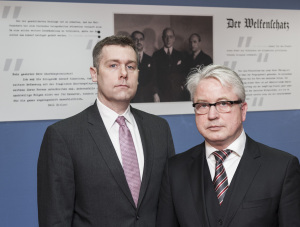(WASHINGTON-July 2, 2020) The United States Supreme Court today agreed to hear the appeal by Germany and the Stiftung Preussischer Kulturbesitz (SPK) seeking to dismiss the restitution claim by the heirs to the so-called Guelph Treasure (known in German as the Welfenschatz). The claims arise out of the forced transfer in 1935 of the Guelph Treasure by a consortium of Jewish art dealers to agents of Hermann Goering, who personally presented it as a gift to Hitler. In 2018, the Court of Appeals for the D.C. Circuit held that U.S. courts have jurisdiction over the claim under the Foreign Sovereign Immunities Act of 1976 (FSIA). That appellate court had rejected the Defendants’ arguments that U.S. courts lack jurisdiction, and that Germany’s treatment of its Jews in the 1930s should be immune from judicial scrutiny.
Sullivan partner Nicholas M. O’Donnell said, “we are grateful for the opportunity to address the Supreme Court on these important questions about holding Germany accountable for its Nazi-looted art. A 1935 transfer from German Jews to notorious art looter and war criminal Hermann Goering is the quintessential crime against international law, regardless of Germany’s Holocaust distortion in defending this case. Germany seeks to eliminate recourse for Nazi-looted art and the Court will have the chance to answer this question of critical importance for Holocaust victims.” O’Donnell added, “this is also an opportunity to rebuke the Department of Justice and State Department, who turned their back on decades of U.S. policy by siding with Germany’s effort to keep Nazi-looted art.”
Read More
Topics:
United States Supreme Court,
Nazi-looted art,
Department of Justice,
SPK,
Stiftung Preussischer Kulturbesitz,
Hermann Goering,
NS Raubkunst,
Gerald Stiebel,
Prussian Cultural Heritage Foundation,
Federal Republic of Germany,
Alan Philipp,
Welfenschatz,
State Department,
Paul Körner,
Jed Leiber
Read More
Topics:
Maria Altmann,
Frankfurter Allgemeine Zeitung,
National Socialists,
Third Reich,
artdaily.org,
Reuters,
United States Supreme Court,
Gestapo,
Haaretz,
Deutschlandradio. Deutsche Presse Agentur,
Robin Young,
the Guardian,
The Art Newspaper,
Foreign Sovereign Immunities Act,
The Wall Street Journal,
Deutsche Welle,
Santa Fe,
KRQE News 13,
the Observer,
Markus Stoetzel,
Die Erle,
Mel Urbach,
Nazis,
Advisory Commission,
3SAT,
ZDF,
Stiftung Preussischer Kulturbesitz,
Washington DC,
Hermann Goering,
Private Wealth,
Restitution,
Sullivan & Worcester LLP,
Here & Now,
Gerald Stiebel,
World War II,
Foreign Sovereign Immunities,
flight tax,
Süddeutsche Zeitung,
Adolf Hitler,
United States District Court,
The New York Times,
Federal Republic of Germany,
BBC News Europe,
Alan Phillip,
Welfenschatz,
NPR,
PrivateArtInvestor,
ArtNet news
I filed yesterday a new civil action against the Federal Republic of Germany and the Stiftung Preussischer Kulturbesitz (the SPK, which is responsible the administration of the Berlin museums, among other things) in the United States District Court in Washington, DC. You can read the Complaint here. The lawsuit seeks the immediate restitution to my clients of the collection held by the SPK known as the Welfenschatz, or as it is referred to in English, the Guelph Treasure. My clients Gerald Stiebel and Alan Phillip are the blood relatives and successors to the consortium of Jewish art dealers who were threatened and forced by the National Socialist government into selling the Welfenschatz in 1935.
Read More
Topics:
Maria Altmann,
National Socialists,
Third Reich,
Philipp v. Federal Republic of Germany et al. 15-c,
United States Supreme Court,
Gestapo,
Foreign Sovereign Immunities Act,
Markus Stoetzel,
Mel Urbach,
Nazis,
Advisory Commission,
Stiftung Preussischer Kulturbesitz,
Washington DC,
Hermann Goering,
Restitution,
Sullivan & Worcester LLP,
Gerald Stiebel,
World War II,
flight tax,
Adolf Hitler,
United States District Court,
Federal Republic of Germany,
Alan Phillip,
Welfenschatz
Read More
Topics:
Maria Altmann,
National Socialists,
Third Reich,
Philipp v. Federal Republic of Germany et al. 15-c,
United States Supreme Court,
Gestapo,
Foreign Sovereign Immunities Act,
Markus Stoetzel,
Mel Urbach,
Nazis,
Advisory Commission,
Stiftung Preussischer Kulturbesitz,
Washington DC,
Hermann Goering,
Restitution,
Sullivan & Worcester LLP,
Gerald Stiebel,
World War II,
Foreign Sovereign Immunities,
flight tax,
Adolf Hitler,
United States District Court,
Federal Republic of Germany,
Alan Phillip,
Welfenschatz
The Supreme Judicial Court, the high court of the Commonwealth of Massachusetts, has answered a certified question from the Bankruptcy Court about the interpretation of Massachusetts’s fine art consignment law, G.L. c. 104A. The case, Eve Plumb et al. v. Debra Casey, SJC-11519, originated with an art dealer’s bankruptcy and the claim by the trustee in that bankruptcy that the artwork in the dealer’s possession belonged to that bankrupt dealer, not the artists. The SJC has interpreted the 2006 amendments to the law for the first time and clarified the roles of everyone involved. In full disclosure, I did some work for two of the artists (Dylan Stark and Robert Stark) at an early phase of the Bankruptcy Court proceedings. Eve Plumb, now an artist but also well known as the actress who played Jan Brady on The Brady Bunch, was another of the artist-claimants. In sum, once an artist delivers a work of art for sale for the purpose of exhibition or sale, it is a consignment, and the seller/consignee holds it in trust for the artist, regardless of the consignee’s own circumstances.
Read More
Topics:
Legislation,
consignment,
United States Supreme Court,
The Brady Bunch,
Jan Brady,
Allyson Wynne,
Commonwealth of Massachusetts,
Debora Casey,
Supreme Judicial Court,
SJC,
Bankruptcy,
Wynne Fine Art Inc.,
Eve Plumb,
Bankruptcy Court,
consignor,
G.L. c. 104A § 2,
Kenneth Wynne III,
G.L. c. 104A § 1,
U.C.C.-1 statement,
U.C.C. Secretary of State,
Chatham,
Chapter 7,
Uniform Commercial Code,
certified question,
Dylan Stark,
Robert Stark,
Eve Plumb et al. v. Debra Casey,
Jim Grace,
SJC-11519,
Arts and Business Council




